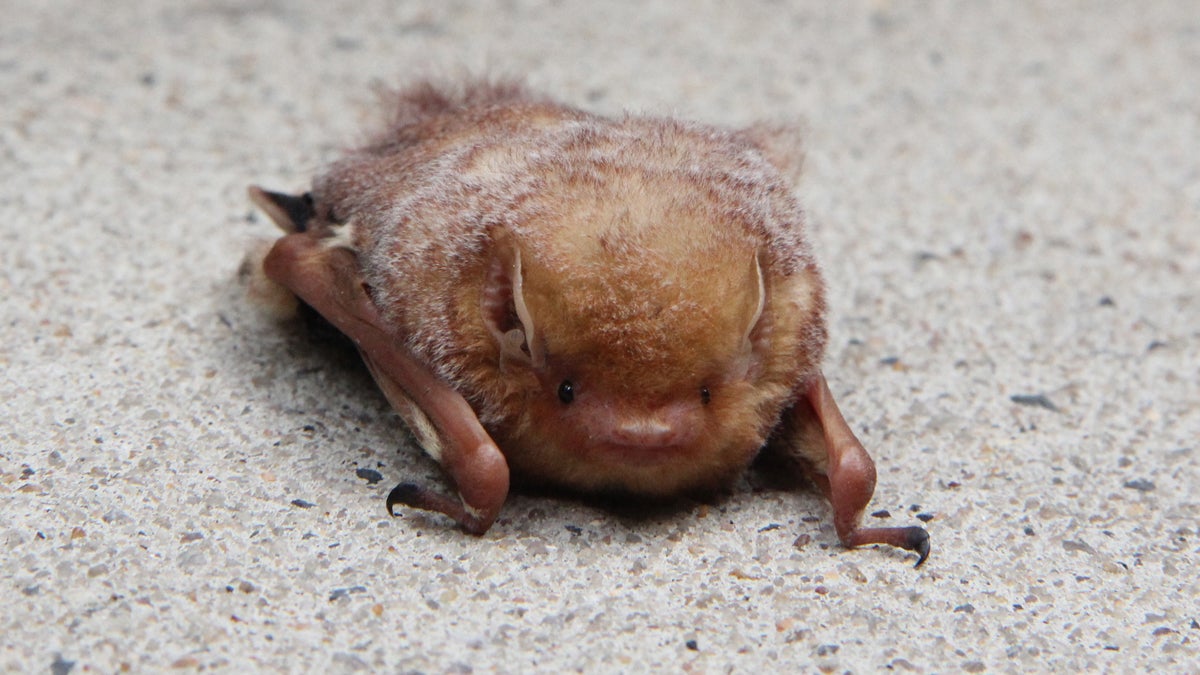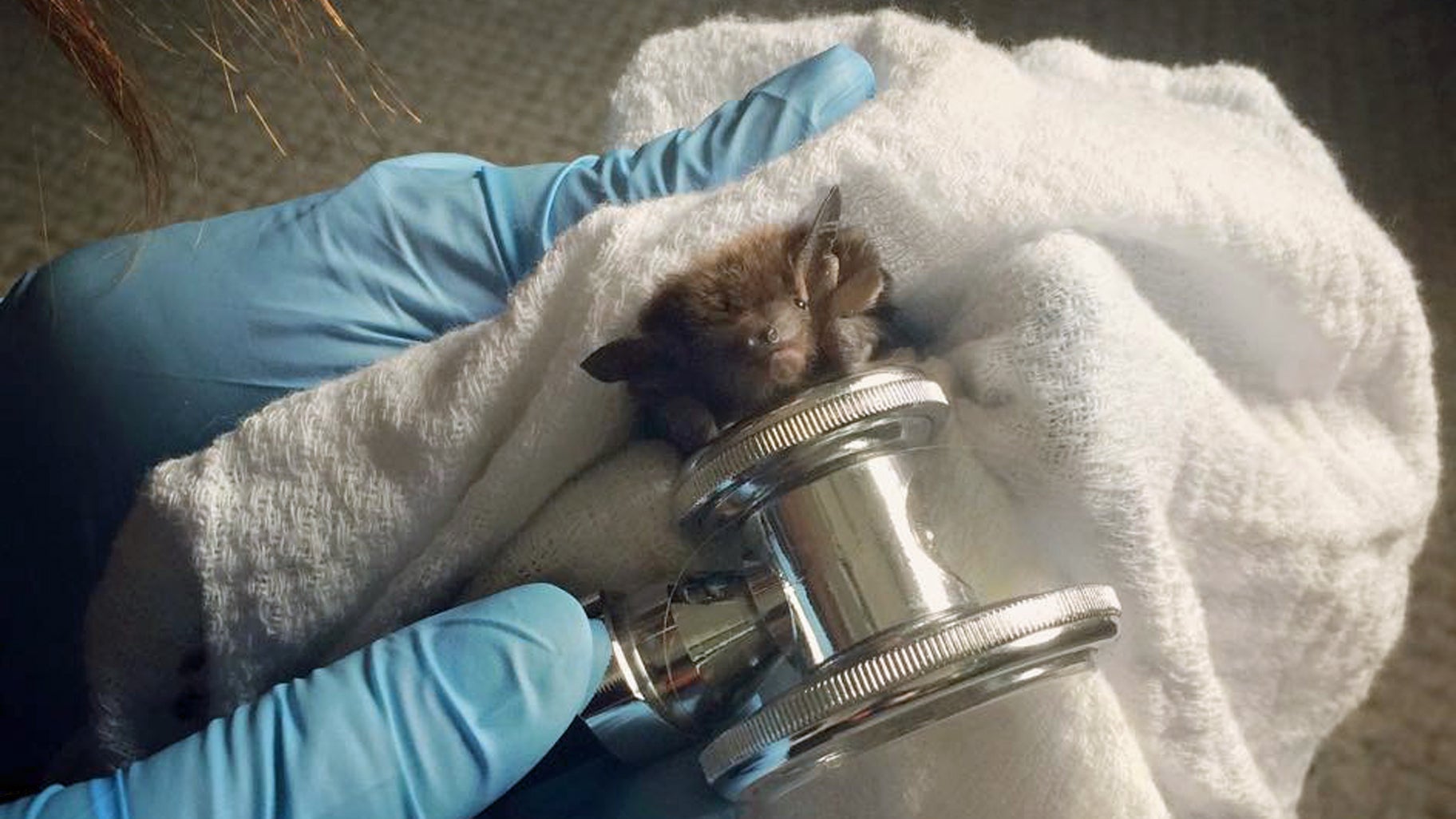Bats bites a summer peril… but experts say, don’t panic

(Emma Lee/WHYY)
While the Philadelphia region isn’t home to the blood-sucking bats of Hollywood lore, bats have bitten or scratched nearly 500 people in Philadelphia in the last five years.
Stephanie Stronsick knows the feel of a bat bite. As a wildlife educator who rescues and rehabilitates injured bats, she’s felt the sting of their tiny teeth about 10 times.
“It is very painful, like a bunch of hypodermic needles all at once,” said Stronsick, who lives just outside Topton, Berks County.
While the Philadelphia region isn’t home to the blood-sucking bats of Hollywood lore, bats have bitten or scratched nearly 500 people in Philadelphia in the last five years, according to the Philadelphia Department of Public Health.
 (Image courtesy of Stephanie Stronsick)
(Image courtesy of Stephanie Stronsick)
That’s nothing compared to dogs and cats, which together accounted for nearly 6,900 bites in Philly since 2011, health department data shows.
But bats are the primary transmitter of rabies in the United States, according to the federal Centers for Disease Control. Left untreated, rabies can be fatal. So add that fact to the following converging trends, and you can see why an average of 100 bat exposures a year in a city of 1.5 million people concerns public health officials:
Bats are most active now, in the summer, because they typically hibernate in cold weather.
Bats could be in your house – and bites and scratches most often happen when people try to move them outside. Large and small brown bats – the most common of the nine bat species native to Pennsylvania – are crevice-roosting mammals that can squeeze through cracks smaller than a half-inch, Stronsick said. That means you might find them in attics, eaves, and otherwise indoors, she added.
Bat bites and scratches are probably more commonplace than the data suggests. “We do believe animal exposures are underreported,” said Dana Perella, a health department epidemiologist. “We take these potential exposures very seriously. While cases of human rabies are very rare, we want to get that animal captured by our animal control to determine whether it’s healthy or not. And we’re going to err on the side of caution and recommend that the person exposed get vaccinated, especially if that person was someone who may have been asleep in a room where a bat was, or a young child, or someone incapacitated or intoxicated – someone who can’t say whether or not they were exposed.”
So … time to panic?
“No, not at all!” Stronsick said.
Bats are misunderstood, beneficial creatures who deserve protection, Stronsick and other bat fans say.
“Bats, when they’re not flying, are actually kind of small. Their large wing spans make them look larger,” Stronsick said. When they’re trapped in a bedroom or somewhere around humans, she added, they will dive in a way people might find threatening. “But they’re just trying to get speed because they’re terrified, and they just want to go hide somewhere,” she said.
Bats aren’t aggressive and typically bite or scratch only to get away from humans, said Kris Baccari, who owns A Wildlife Pro, a Montgomery County-based animal control business.
“If I grab you by your neck, you’re going to bite me, right?” Baccari said. “Bats are gentle animals that are out protecting us at night (eating 1,000 mosquitoes an hour). They are very vital to our ecosystem.”
They’re also protected by Pennsylvania game laws. That means it’s illegal to kill or hurt them, which can make removing them from homes tricky – especially between May and September, when female bats give birth.
“We’re not allowed to evict the mothers, because the baby bats could die,” Baccari said.
Bats and humans can coexist peacefully, but experts recommend they be booted outside – although not necessarily because of the risk of rabies. Bat guano is the real problem.
“People think that bat guano has a lot of parasites, but it’s actually the histoplasmosis fungus that likes to grow on animal feces. The attic is hot and humid; that’s perfect conditions for this fungus (which can cause lung infections in humans) to grow,” Stronsick said.
Stronsick and public health officials advise people to hire professionals to remove bats to avoid getting bitten, scratched or otherwise exposed to bats’ saliva or bodily fluids. Professional animal-control workers seal cracks where bats may have entered a home and then install sleeves, made of mesh, netting or soft material that won’t damage delicate wings, where they suspect bats got in, Baccari said. The sleeves allow bats to leave the home, but prevent them from reentering, he added. Read the Philadelphia health department’s advice on what to do if you find a bat in your home here.
“When a bat decides they like a structure as a home, they will find a way to occupy it,” said Stronsick, who works as a zookeeper at the Lehigh Valley Zoo and runs the Pennsylvania Bat Rescue in her spare time. “Although it’s very rare for us to get a positive (rabid) bat back, you don’t want to risk that.”
WHYY is your source for fact-based, in-depth journalism and information. As a nonprofit organization, we rely on financial support from readers like you. Please give today.




